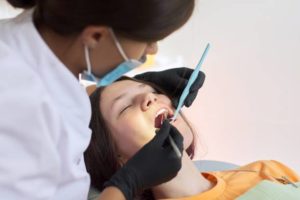Am I a Candidate for General Anesthesia for Dental Care?
September 22, 2023
 Sedation dentistry allows you to sit back and relax when needing dental work or dealing with anxiety. Nitrous oxide and oral conscious sedation are effective, but some situations may require a stronger solution. General anesthesia is the highest level of dental sedation and is only reserved for certain patients. Here’s what you need to know to determine if you might be a candidate for general anesthesia.
Sedation dentistry allows you to sit back and relax when needing dental work or dealing with anxiety. Nitrous oxide and oral conscious sedation are effective, but some situations may require a stronger solution. General anesthesia is the highest level of dental sedation and is only reserved for certain patients. Here’s what you need to know to determine if you might be a candidate for general anesthesia.
How Does General Anesthesia Work?
Laughing gas and oral conscious sedation create a high level of relaxation, but they don’t render you unconscious. General anesthesia differs because it does cause a state of unconsciousness. Therefore, you won’t feel anything during your procedure and you’ll have no memory of your experience. It can take a few hours for the effects to wear off, so you’ll need to arrange transportation home.
Candidates for General Anesthesia
General anesthesia is recommended for patients requiring complex or invasive treatments, like oral surgery. It’s safe for most patients with good health; however, only your dentist can determine if it’s right for you. They will learn more about your medical history and any medications you’re taking to look for anything concerning. Depending on your situation, they’ll ensure general anesthesia is the best option. It can be recommended for patients with:
- Extensive Treatment Plans
- Uncooperativeness
- Special Needs
Side Effects of General Anesthesia
General anesthesia can cause more unwanted side effects than sedation or local anesthetics. Reactions vary from person to- person, but common temporary issues include:
- Nausea or Vomiting
- Headache
- Sweating or Shivering
- Confusion
- Hallucinations or Delirium
- Slurred Speech
- Dry Mouth or Sore Throat
- Pain at the Injection Site
- Dizziness
- Fatigue
- Numbness
Precautions with General Anesthesia
Although general anesthesia is a great option, it’s not safe for everyone, like pregnant women. Your dentist will discuss the benefits versus the risks of anesthetics for you and your unborn child. Older adults with underlying health issues can have higher rates of adverse reactions, like heart, lung, or liver problems. It may not be suitable for patients with certain neurological conditions or other health concerns, like Alzheimer’s disease.
Discuss your health history with your dentist, including any OTC medications, supplements, or natural remedies. Don’t worry, your dentist will determine the best strategy to keep you comfortable while performing the dental care you need. Your safety will always be their top priority.
About Dr. John Neely
Dr. Neely graduated at the top of his class from the University of Louisville with his Doctorate of Dental Medicine and has regularly continued his education in various specialties, including dental implants and sedation dentistry. He can ensure patients have a relaxing environment with dental sedation. Dr. Neely is affiliated with many professional organizations, including the American Dental Association. Request an appointment through his website or call (217) 993-9317.
No Comments
No comments yet.
RSS feed for comments on this post.
Sorry, the comment form is closed at this time.
